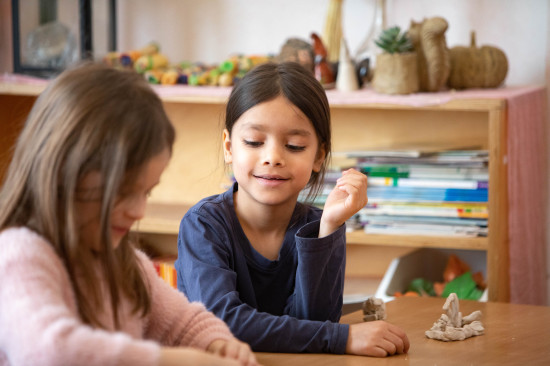Anthroposophy in Waldorf Education
Waldorf education encompasses the anthroposophical understanding of the human being as body, mind and spirit and Steiner's theories on the stages of child development.
This means that in addition to providing children with learning across a range of knowledge and skills it is of equal importance that teachers seek to understand and take account of the spiritual experience or inner life of each child from a non-denominational perspective. Striving to care for the 'heart' in each child is a central characteristic of how Waldorf education seeks to nurture the development of key capacities such as confidence, creativity and adaptability to create a balanced, whole person able to face life with strength and resilience. This practice mirrors modern day understanding in psychology (only a fledgling discipline in Steiner's time) that to listen to and value a child builds resilience.
In addition and unique to the Waldorf approach are Steiner's theories on the importance of life processes and the senses which encompass his artistic theories on speech, music, eurythmy, craft, painting and sculpture. These activities, for which Waldorf schools are well known, nurture children's inner life and holistic development emotionally and physically as they learn. They are not 'extras' but embedded in the curriculum and integrated through everything the child experiences at school.
Most other concepts within anthroposophy are not directly relevant to Waldorf education although teachers who are anthroposophists may reference these. It is not necessary to be an anthroposophist to be a Waldorf teacher nor is it necessary to have read or agree with all of Steiner's lectures and writings but having the understanding and ability to care for the the spiritual side (or "inner life") of child development is what gives Waldorf education its special essence. Teachers are also encouraged to support their teaching and understanding of the children's needs by taking care of their own personal development and well-being through meditative and other practices. In schools teachers may use the terminology of anthroposophy which can be confusing and sometimes misleading, especially if usage is imprecise. Here is a table that explains those concepts in plain language and their relevance to education provision.
It is a fundamental principle that anthroposophy is not taught in schools nor used to create a particular "worldview". A key anthroposophical principle is that each child be enabled to become their true selves and to create their own personal destiny.

